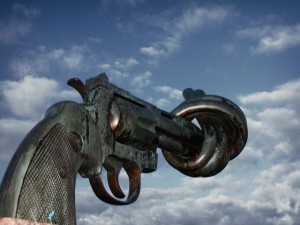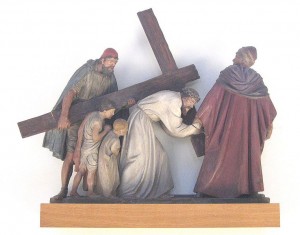 Sight have just put up my article on what Easter has to do with the realities of today’s world of earthquakes, fighting in Libya, child poverty, and the carbon tax. Often we talk about the wonder of this time of year – the most important in the Christian calendar – but we don’t know what relevance it has to do with the rest of the world. Check out the article here.
Sight have just put up my article on what Easter has to do with the realities of today’s world of earthquakes, fighting in Libya, child poverty, and the carbon tax. Often we talk about the wonder of this time of year – the most important in the Christian calendar – but we don’t know what relevance it has to do with the rest of the world. Check out the article here.
Author: soulthoughts (Page 30 of 53)
 Fascinating article in today’s Age about the declining knowledge of basic biblical stories in society in general, and yet despite that, the importance with which they are still held by many in our secular culture.
Fascinating article in today’s Age about the declining knowledge of basic biblical stories in society in general, and yet despite that, the importance with which they are still held by many in our secular culture.
Some non-religious people interviewed for the article were still in favour of the biblical stories being told in our culture. Despite our overwhelmingly secular and postmodern society, there is still a need for a meta-narrative, an overarching story, even if many people might not believe in its historical veracity.
The biblical narrative of a loving God coming to Earth in the man Jesus Christ still resonates with something deep in the human psyche. Somewhere amidst the rampant consumerism and desperation to get by and get ahead, there is still a desire to ground our lives in something outside ourselves.
For all the good points in the article though, I find it incredibly sad and barely believable that a university anthropologist can seriously compare Jesus to Batman, Bob the Builder, and Thomas the Tank Engine. Apart from the pathetic comparison though, the Christian faith is also not about a set of values; it is about relationship and reconciliation, the setting to rights of the whole of creation, to God and to each other. It is about transformation of the human heart, something which Batman nor the other people characters mentioned above, even claim.
What is perhaps sadder is that a survey by Barna in December 2010 showed the declining biblical literacy rate amongst Christians, including theological students. While Barna is US-based, my conversations with people show the same to be true in Australia. It matters what we believe.
 When I was in my late teens, I believed that salvation was all about having a personal relationship with Jesus so I would get to heaven when I die and avoid hell. While social justice was good, it was not the main game, as people’s eternal destiny was surely infinitely more important.
When I was in my late teens, I believed that salvation was all about having a personal relationship with Jesus so I would get to heaven when I die and avoid hell. While social justice was good, it was not the main game, as people’s eternal destiny was surely infinitely more important.
I don’t believe that today. I still believe that a personal relationship with Jesus is crucial – the human heart needs just as much renewal as society does – but today I believe that any ‘salvation’ that stops there is not biblical and is not honouring God for who God is. Any kind of ‘salvation’ that stops at a personal relationship with Jesus is too small and does not understand how much God loves everything that God made. Salvation is spiritual, sure, and it is physical, emotional and social as well.
In September 2010, World Vision Australia held a theological forum looking at the question of what social justice has to do with salvation. The speakers were Tim Foster from Ridley College, Merrill Kitchen, former Principal of the Churches of Christ Theological College, and Siu Fung Wu from World Vision. Each of them gave a presentation on their view of the topic, and papers of each of their presentations, along with a response by me, have now been published online in Ridley College’s Centre for Applied Christian Ethics paper, BriefCACE. Click here to check them out.
 As we grow in our journey of faith, our life circumstances don’t necessarily improve, but our ability to deal with them does. Jesus said that the rain falls on the good and the bad alike. Life happens, but maturity is seen in our response to it.
As we grow in our journey of faith, our life circumstances don’t necessarily improve, but our ability to deal with them does. Jesus said that the rain falls on the good and the bad alike. Life happens, but maturity is seen in our response to it.
A couple of people more mature than I am have pointed out that life is about how you deal with loss, ultimately to the loss of your life. This is facing life realistically.
N.T. Wright says that at communion we must remember it as not just the extension of God’s past (or Jesus’ past) into our present, but also as the arrival of God’s future into the present, for this is what Jesus’ resurrection did. In him the kingdom of God broke into history. After all, Jesus did say that this was the body and blood of the new covenant. Something to think about when we take communion this weekend.
 I went camping on the weekend with some other blokes who are part of a men’s group I am in. Part of our time included a couple of hours alone on Sunday morning, out in nature, just taking it in, not thinking too much, not analysing it, but just being part of it.
I went camping on the weekend with some other blokes who are part of a men’s group I am in. Part of our time included a couple of hours alone on Sunday morning, out in nature, just taking it in, not thinking too much, not analysing it, but just being part of it.
I begin by walking along a track along a river. As the track winds closer to the river and then further from it, I find myself wanting to be drawn to the fast and gently flowing water, so clean and clear. So I find a little clearing and sit down by the river, somewhat mesmerised by what I can only call the gentle rush of the streams of life-giving water flowing past me.
As I sit down, a cockatoo flies overhead, its screech piercing the silence. Sitting there amongst the wildness out in nature, with the ferns and trees standing in the stillness all around me, I feel like I am intruding on their territory. But then I realise I am not intruding, for I too am part of nature. I am out here too, just observing. I belong here too.
I am reminded of what Bill Plotkin says about nature, that it is without self-consciousness. As he puts it, it is just there, without any apparent wish to be otherwise, without even a glimmer of identity crisis. As I sit there I realise that the birds flying overhead, the ferns growing all around me, the bush, the scrub, would all be here anyway if humans had never existed. It doesn’t need us. It makes me respect it more. It doesn’t fight back; it is vulnerable, helpless, open to abuse, and impossible to control. I realise that this is a great definition of love: vulnerable, open to abuse, yet still giving unconditionally.
As I sit there, a small fern is right next to me, touching me. One of the light branches is actually resting on my arm, like it is reaching out to me, without fear and despite its helplessness, almost like it is reassuring me. This was the same fern that I was fleetingly tempted to rip out of the ground as I was about to sit there by the river so I could get a better view. Such is my selfishness when I am disconnected. I was glad I didn’t act out my fleeting murderous intent.
To some this may sound like some New Age claptrap. To the contrary, God’s love is revealed in nature. I am reminded that Jesus told his hearers to consider the lilies, that they don’t worry about how they look (Luke 12:27). It is good to see nature as Jesus sees it.
After a while of sitting by the river, I get up, leave it and walk further along the trail. As I walk through this wild land that the Black Saturday bush fires had swept through just two years before, I imagine the fires racing through here, taking all before them, leaving nothing in their wake. Total destruction. But then I wonder: purely in terms of nature, is it destruction or is it part of the renewal cycle of life?
As I walk on I see hoofprints in the dirt. They remind me of another wonderful side of nature: the contrasting gentleness and yet wildness of a horse. Then I look around me, seeing green fields in the distance, peaceful and beautiful. Out here, away from the distractions of everyday life, I am aware of my responses. I realise how fragile nature is and I see that looking after it is something to be done for nature’s sake alone and not just for its effect on humans. Nature has value in its own right. After all, God said it was good. Nature reflects the glory of God.
I walk further, up a steep hill, my heart pounding each time I stop. After a minute I walk off the track into the bush and notice the quieter sounds around me, not just the bird noises overhead, but the gentler sounds of what may be little creatures in the scrub. I walk back down the hill and notice a green shoot, fragile and tiny, growing on its own out of the dirt. I am struck not simply by what this might symbolize, but what it is, nature pushing through where it is not expected.
I walk on and I notice an ant on the ground which has stopped moving, maybe when I stepped near it. I bend down to observe it, gently prodding it to see if it is still alive. It moves slightly, then stops again, so I prod it again, and it moves slightly again, and starts walking, over the bumps and grooves in the dirt made by my boots. I notice that it doesn’t need to walk straight in the grooves, to be ordered like I think I have to be. It just walks wherever it sees is best for its purpose.
This was my morning with nature. It is something I think everyone of us should do with some regularity. We spend too much of our time inside these days, trapped in front of our screens, slaves to technology. And the more we are enslaved, the more we miss the goodness of the vast, wild awesomeness of the pure, natural world that God created simply because it is God’s nature to create. We do well to immerse ourselves in it.
 There was a wonderful sermon by Shane Claiborne this morning at Surrender. He spoke about tearing down walls in our lives and in the world, and how that is what the kingdom is about. Some of the other points Shane made were as follows:
There was a wonderful sermon by Shane Claiborne this morning at Surrender. He spoke about tearing down walls in our lives and in the world, and how that is what the kingdom is about. Some of the other points Shane made were as follows:
- The rich man and Lazarus – the rich man seemed to be a religious man. He knew the prophets, he referred to ‘Father’ Abraham.
- The gates of hell will not prevail. We need to storm the gates.
- God loves people back to life.
- Referring to Ash Barker’s book, Shane said we won’t make poverty history until we make poverty personal.
- Wounded people should be our greatest teachers. He reminded us that Henri Nouwen spoke about the wounded healer.
- We need to be very careful not to think too highly of ourselves if we want God to use us.
- Iraqi Christians are praying for North American Christians. They said Iraq is where it all started and that North America didn’t invent Christianity, they only domesticated it.
- He knows some people who are working with Friends Without Borders.
During his talk Shane showed shots of the Israel/Palestine wall with moving paintings on it of people tearing down or opening up the wall. May it happen soon and may it happen peacefully. It happened in Berlin in 1989 and it can happen again with enough pressure.
 More from Richard Rohr on the revolutionary nature of Jesus’ life, and how freeing it actually is:
More from Richard Rohr on the revolutionary nature of Jesus’ life, and how freeing it actually is:
Shame and honor, and the maintenance of these divisions, were, in fact, primary moral values in the culture Jesus lived in. As a result, required retaliation was the rule in Jewish culture, as it has been in most human cultures. Without it, a man lost all honor and respect.
For Jesus to walk into the midst of that and to say, “Do not retaliate” is to subvert the whole honor/shame system (Luke 6:27-35) in one blow. People who heard this would wonder, “How do I find my self-image, my identity? How would I have any respect?”
Jesus is pointing radically to God: Who you are in God is who you are, nothing more and nothing less. In that free space there are no ups and downs, no dependence upon families and villages and friends for self-esteem, upon wealth or good societal standing for our inner value.
You might think Jesus is asking too much, or being unrealistic; but he is actually freeing you from all of the emotional ups and downs, the ego dramas, that create almost all human violence, self-hatred, and unhappiness.
Adapted from Radical Grace: Daily Meditations, p. 371, day 384
I get frustrated when people say that these type of teachings by Jesus were not what he really meant, are meant in a metaphorical way, and are not to be taken literally. That’s rubbish. Why would he say them if he didn’t want us to live them out? The reason we shy away from teachings like this has more to do with the type of God we believe in than with what God is actually like. We want a God who will not bother us, a God we can make in our own image. It has been said by a few people that God made us in His image and we have been trying to return the favour ever since. Thankfully the liberating gospel of Jesus shows us otherwise.
 Do you own your faith? I mean really own it. Or is it something that has ‘always been there’? Many of us have grown up in households where Christian faith was practised, at least nominally, and sometimes it has helped us and sometimes it has hindered us. The fact is that for many of us who grew up in a somewhat Christian home, our faith has never progressed much past what our parents have believed and passed onto us.
Do you own your faith? I mean really own it. Or is it something that has ‘always been there’? Many of us have grown up in households where Christian faith was practised, at least nominally, and sometimes it has helped us and sometimes it has hindered us. The fact is that for many of us who grew up in a somewhat Christian home, our faith has never progressed much past what our parents have believed and passed onto us.
For faith to mature, it needs to be tested, it needs to progress out of our comfort zone. Tim Costello has said that you only begin to understand your own faith when you move out of your comfort zones. Someone else said to me years ago that anything worth fighting for is never going to be easy. Faith is definitely worth fighting for, and it is indeed a risk. It is tough to step out and embrace what is unfamiliar. It puts us on shaky ground where our only option is to trust in the goodness of God. But it is in that very place that we grow and experience life as Jesus described it in John 10:10.
If you’re anything like me you will also have struggled with the temptation to take on a particular belief just because someone you admire believes it. Such an action is often borne out of an insecurity in which we are not quite sure what we believe. This insecurity can also make us want to stand out from the crowd, so if someone well known believes something a bit different, people may just admire us if we believe it as well. The problem with that is that we actually don’t really believe it at all. We are instead trying to build or maintain a reputation based on the faith of someone else. When this ‘faith’ is put to the test, we find that we have built our house on sand rather than the solid bedrock of genuine faith.
If we persevere though, and we are able to se through our deception, we find that our beliefs become our own, and they are no longer simply beliefs; over time they instead become convictions, something we ‘know’ deep down. Rob Coyle said years ago that conviction is something that goes far deeper than belief. Convictions are things for which we would be prepared to lay down our life.
What we believe matters, and it matters how much we believe it. Having strongly held convictions makes us much more sure of ourselves and allows us to love more powerfully. But for beliefs to turn into convictions requires us to be committed to growth. If we are maturing in our faith, we will not be so afraid of being challenged; in fact we will welcome it as an opportunity for further growth. But if we are a new believer, or we have long struggled with doubt, we can quickly become disillusioned if our faith is challenged, or if someone we look up to behaves in a way that is not in line with our dearly held beliefs of what it is to be a Christian.
I used to struggle when I heard about Christians I looked up to doing something I didn’t think was Christian. When I was in my late teens I started to admire Martin Luther King for his stance on civil rights, and his courage to live out his convictions. Then one day I saw a photo of him smoking a cigarette. Some people reading this will wonder what the fuss is about, while others will have a similar reaction to that which I did. In my thinking back then you couldn’t be a Christian if you were a smoker. I judged Martin Luther King through the lens of my own theology. I didn’t have the maturity to look past such matters to the weightier matters of justice mercy and faithfulness (Matt 23:23). As I have grown in my faith and have become more acutely aware of my own shortcomings, I am able to have just as much respect for people like Martin Luther King as if he never smoked a cigarette in his life. I don’t condone smoking, but in the life of someone like him I don’t consider it anywhere near a game breaker. The fact that he also had well-documented affairs is another issue, but I have also realised that the deep moral failures of such people make them more human, and in a strange way, more accessible. I can relate more to them because I am more aware of my own failings.
One of the most helpful things I read many years ago that helped me to deal with the differences in people I looked up to was a quote that said “you only become disillusioned if you have illusions to begin with”. Realising this has benefited me enormously in my own journey of faith. I realised that I could still look up to someone despite them engaging in behaviour that didn’t fit my theology (within reason of course. If it turned out that someone I admired had spent all their lives being a fraud, my respect for them would quickly diminish). I realised that if I struggled with someone’s behaviour or something they said, it was my job to look at myself and see if there were any illusions that I was suffering from that prevented me from still accepting that person. I didn’t have to agree with every single thing that person said and did to still admire them.
Tim Costello discusses this struggle in his own life in his early days as Pastor of St Kilda Baptist Church. Coming from a middle-class background which taught him such ideals as the one which says cleanliness is next to godliness, he struggled with people who came to his church in St Kilda who didn’t smell right – who maybe hadn’t showered for a while, and who spent all their money on food. He thought that such people could not be real Christians. His illusions contributed to his disillusionment. But then he realised that Jesus and his disciples, especially some of them being Middle Eastern fishermen, would have smelled somewhat too. He also quickly realised that when you live on a low income you don’t think about saving your money because you need all of it to live on. And so it suddenly occurred to him that his background had contributed to his disillusionment. On top of that, when he saw the love of the people who didn’t fit into his theology, he could no longer deny that they were in fact being more Christlike than he was. He had to go through a process of reconversion. As Rikk Watts says, what we see in real life must form our theology, and not vice versa.
Disillusionment can be good for your growth. Depending on how strong you are in your convictions, realising that the people you look up to are only human can actually strengthen your convictions. Recently I had a conversation with an older Christian who I have looked up to for years. Our topic of conversation was something I had been thinking about for a long time, and I realised that I disagreed with him. I also realised that I didn’t have to change my opinion to his just because this was someone I looked up to. I knew what I believed and I could stick with it. And, while our conversation has made me think more about the issue we talked about, I am able to hold to my conviction about it. And on top of that, my respect for this Christian has not diminished. Why should it? He is not God; he is just another human being, albeit a very wise one.
You only become disillusioned if you have illusions to begin with. The fact of our lives is that we all have illusions of some sort. It is part of being human. I have found that getting rid of my illusions is done by a continual surrender of my life to the undeserved love and grace of Christ. As I learn to trust God more, as well as keep in touch with other believers around me, I learn to grow and cherish the relationships I have, and appreciate what I have learned from the many wise people I have been fortunate enough to come across in my life, whether I agree with them or not.
The thing I love about this journey of faith is that the person of Jesus constantly challenges me. There is never a dull moment when you are a serious follower of Christ. It is an adventure of the highest order. As I have learned from reading Larry Crabb, and as I have also found to be true for myself, it is uncomfortable, it is scary, it is thrilling, and it is life. I really do believe this stuff, and in the process I am finding what I have always really wanted.
 I’ve had an emotional couple of weeks. It started when my wife and I attended a conference on a Christian response to climate change. The situation really is dire but our response is not to be one of despair and throwing our hands up in defeat. Our response is to be one of Christlikeness – of love, justice and mercy, especially for the millions who will be affected the most and who have done the least to contribute to it – the poor.
I’ve had an emotional couple of weeks. It started when my wife and I attended a conference on a Christian response to climate change. The situation really is dire but our response is not to be one of despair and throwing our hands up in defeat. Our response is to be one of Christlikeness – of love, justice and mercy, especially for the millions who will be affected the most and who have done the least to contribute to it – the poor.
During some breaks in the conference I was speaking to a few people and found out that a dearly loved woman in our church community who has been suffering from brain cancer had a week to live (she passed on the next morning. RIP Kate – safe in the arms of Jesus). We all thought she had about 9 months but not so now. A few of us went to see her the day before she died, along with her 12 year old son who she last saw as an 8 month old baby. It was so touching seeing her son take his mother’s hand, but also so sad knowing that this will be his only memory of seeing his mother.
During another break in the conference we also found out that a couple we knew had split up, leaving kids traumatized and confused. That weekend was truly a sobering one.
Life is unspeakably sad, as psychologist Larry Crabb puts it. And as a song that we used to sing in church says, life is sad, and it might not get easier. There are no guarantees in life, not in this life anyway. Whatever we try to do to control life, in the end we cannot. Instead we are beholden to the whims of outrageous fortune and there is simply nothing we can do about it. Millions of people in Japan know all about that as I write.
Throughout the uncertainties and failed hopes of life, the Christian message is what sustains me. That is no glib statement; it is the hope of my heart. In Christ is my ultimate hope. He has promised that there will be a day when suffering will be no more, when brain cancer will be wiped away, when love will reign supreme in relationships and when the climate will sustain a healthy planet. Until then, loving is sadness, and we toil on, trudging the rugged, uphill road of life.
But despite our trudging, it is forward that we go, and forward we go together. In community, never alone, and never without ultimate hope.
Life is hard, anyway you cut it. So sang John Mellencamp in a song to which every honest person in the world can relate. We are not spared simply because we are Christian. To the contrary, it is because we follow the crucified One, the suffering God, that our suffering is all the more acute. The rain falls on the just and the unjust. No one is spared, but at the same time, no one is beyond hope.
Personally, I don’t want to give my life to anything else. I love the way of Jesus. No, more than that, I love Jesus Himself. In a world of nonsense, he makes sense. In a world of bitterness and hatred he brings love, and in a world of disease he brings healing. O how I love Jesus, as the old hymn says it.
It is in the times of deepest sadness that love is found. It is at these times that we are shaken out of our slumber and reminded again of what really matters – love, relationship and grace. These are the things that endure. Ross Langmead sings a song which reminds us that we are not alone in suffering, that Jesus goes before us: “We are not alone; he knows our sorrows, he will turn our tears to joy.”
Our suffering is not meaningless. Martin Luther King talked about redemptive suffering, suffering that grows and heals us. The road to life feels like the road to death at times. But it is redemptive. Our pain does not go unheard. It does not simply disappear into an indifferent universe, lost forever with no one knowing and no one caring. Who of us can deny that suffering is real? The promise given to the ancient Israelites when they were suffering under the yoke of slavery in Egypt is the same promise given to us: ‘I have heard your cries and will do something about it.’
What God has done about it is absorb our pain on a brutal Roman cross, and rise from death, never to be defeated again. This was truly victory in defeat, as Sammy Horner so beautifully puts it:
That the nails that pierced his hands
And the thorns that pierced his brow
And the spear that pierced his side
And the nails that pierced his feet
Showed us there can be victory in defeat
We do not go forward in this life alone. Jesus does indeed go before us. Our suffering does not go unheard. It has a purpose and will one day be turned into joy unspeakable. Until then we toil and trudge, but with the hope of a future where this old order of things – death, decay and disease – will have passed away forever. Amen, come Lord Jesus.



